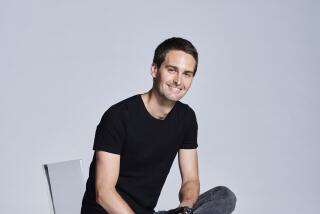The guy who came up with the idea for Snapchat got $158 million and vanished from public life
It’s been six years since then-Stanford University junior Reggie Brown hatched the idea that would become popular vanishing photo app Snapchat.
But while his former friends and Stanford classmates Evan Spiegel and Bobby Murphy are preparing a Wall Street debut for the company now known as Snap Inc. — potentially Los Angeles’ biggest-ever initial public stock offering — little is known about Brown’s whereabouts.
For the record:
5:56 a.m. Nov. 16, 2024An earlier version of this article misidentified Joshua Hamby as Joshua Hambly.
Legal documents provide a limited window into the dispute that ended with Brown’s ouster from the company months after its founding. And social media gives few clues about his life after graduating from Stanford. Brown could not be reached for comment.
Sometimes, all it takes is $158 million to make someone vanish from the public eye.
Brown attended high school at McCallie School, an all-boys, private boarding and day school in Chattanooga, Tenn. A boarding student from South Carolina, Brown was on the crew team and also achieved academic distinctions, being named a National Merit Commended Scholar and joining the National Honor Society and Cum Laude Society, said Jim Tanner, deputy director of communications and marketing at McCallie.
His acceptance into Stanford was a pivotal moment. McCallie classmate Joshua Hamby, 27, said he remembered Brown sprinting shirtless across the high school campus, acceptance letter in hand.
“I was in the dorm at the time, and we could all hear him,” Hamby said.
Brown started at Stanford in 2008. In the spring of 2011, the English major came up with an idea — a mobile app that would enable users to send disappearing photo messages. He shared his idea with fellow Kimball Hall dorm-mate Spiegel.
The two shook hands on a partnership and later recruited a third partner, Murphy, to serve as the project’s coder, according to a court filing. The three verbally agreed that each would have one-third ownership and profit interests, and set roles for each partner: Brown was chief marketing officer, Murphy was chief technology officer and Spiegel would serve as chief executive, according to court documents.
In court documents, Brown also said he came up with the app’s now-recognizable ghost logo, which he nicknamed Ghostface Chillah.
After the school year ended, the three worked on the app, then known as Picaboo, at Spiegel’s father’s home in Pacific Palisades. Picaboo launched in the iTunes Store in July 2011.
But soon after, the three partners had a “contentious phone conversation” about the start-up, according to the court filing. Spiegel decided Brown’s contribution wasn’t measuring up, according to Spiegel’s deposition, and Spiegel and Murphy changed the passwords for the start-up’s servers and accounts.
Brown later sued Spiegel and Murphy in 2013, alleging breach of contract. They settled in 2014, and Snapchat released a statement at the time giving Brown credit for originating the idea of an app that would send disappearing photo messages.
“We acknowledge Reggie’s contribution to the creation of Snapchat and appreciate his work in getting the application off the ground,” Spiegel said in the statement.
Snap’s filing in early February with the Securities and Exchange Commission showed that Brown received a total of $157.5 million in the settlement — $50 million in 2014 and $107.5 million in 2016.
Since then, Brown has kept a low profile. In July 2013, he entered Duke University’s Fuqua School of Business and completed the 10-month master’s degree program in management studies in May 2014.
Aside from that, there are scant details of Brown’s life.
He has filed applications to incorporate two limited liability companies, one in April 2012 called FRBIV, based in Columbia, S.C., and one in December 2016 in Isle of Palms, S.C., called Rita Brown.
Records seem to indicate that Brown now lives in Columbia.
Hamby said he lost touch with Brown after high school graduation, and only had one conversation with him early in their college careers. But Hamby remembered when he found out that Brown was behind Snapchat. He wasn’t surprised.
“You couldn’t talk about the weather with this guy without him saying, ‘Oh, why can’t we do this?’ ” Hamby said. “Always a problem-solver and an ideas guy.”
More to Read
Inside the business of entertainment
The Wide Shot brings you news, analysis and insights on everything from streaming wars to production — and what it all means for the future.
You may occasionally receive promotional content from the Los Angeles Times.











